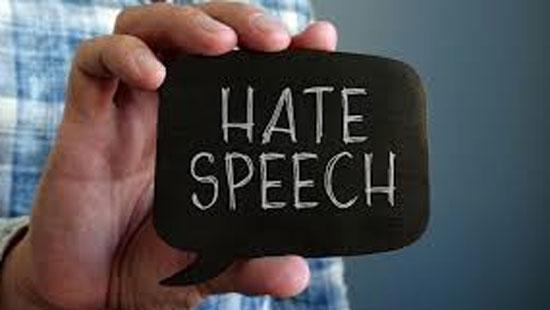21 Mar 2024 - {{hitsCtrl.values.hits}}
 In the picturesque landscapes of Sri Lanka, a nation known for its rich cultural tapestry and diverse communities, a troubling trend has emerged - the proliferation of hate speech.
In the picturesque landscapes of Sri Lanka, a nation known for its rich cultural tapestry and diverse communities, a troubling trend has emerged - the proliferation of hate speech.
As distrust among people escalates and conflicts rooted in nationality and religion become more prevalent, Sri Lankans are joining hands to combat this scourge threatening their social fabric.
The insidious nature of hate speech, fueled by negative preconceptions and intolerance, has permeated various aspects of Sri Lankan society. From online platforms to real-world interactions, individuals and groups have become targets of discrimination and violence based on their religious beliefs, ethnicity, and other defining characteristics. The consequences have been dire, leading to widespread fear, division, and societal unrest.
Recent events in Sri Lanka serve as poignant reminders of the destructive power of hate speech. The anti-Muslim attacks in Kandy in 2018, triggered by incendiary rhetoric spread through social media channels, unleashed a wave of violence and destruction, leaving scars that still linger today. Dr. Shafi Shihabdeen's plight, subjected to vilification and persecution following false allegations, epitomizes the human cost of unchecked hatred.
In response to these challenges, Sri Lanka has implemented legal measures to address hate speech. The International Covenant on Civil and Political Rights Act provides a framework for prosecuting individuals inciting hatred based on national, racial, or religious grounds, with stringent penalties including imprisonment. While legislation provides a necessary deterrent, societal change requires a multifaceted approach.
At the heart of the struggle against hate speech lies the imperative for unity and understanding. Sri Lankans, irrespective of their backgrounds, must come together to foster tolerance, respect, and dialogue. Education emerges as a potent tool in this endeavor, with parents and educators tasked with nurturing values of inclusivity and empathy in future generations. Media outlets, too, play a crucial role in promoting balanced and constructive discourse, steering away from sensationalism and division.
Moreover, the government's role in enacting and enforcing legislation to curb hate speech cannot be overstated. By providing a legal framework to address online extremism and hate crimes, authorities can send a clear message that intolerance will not be tolerated in Sri Lankan society.
Individuals, too, bear a responsibility in the fight against hate speech. By actively reporting instances of hatred, offering support to those affected, and leveraging social media as a force for positive change, every citizen can contribute to building a more cohesive and harmonious nation.
Sri Lanka's battle against hate speech continues to gain momentum as citizens from all walks of life unite against the rising tide of extremism. In a nation renowned for its breathtaking landscapes and vibrant cultural heritage, the prevalence of hate speech poses a significant threat to the harmony and stability that Sri Lankans hold dear.
The consequences of unchecked hatred reverberate throughout the fabric of Sri Lankan society, permeating both online platforms and face-to-face interactions. Individuals and communities find themselves targeted based on their religious beliefs, ethnicity, and other defining characteristics, leading to an atmosphere of fear and division.
Recent events, such as the anti-Muslim attacks in Kandy in 2018, serve as stark reminders of the destructive power of hate speech, leaving lasting scars on the nation's collective psyche.
In response, Sri Lanka has implemented legal measures to combat hate speech, including the International Covenant on Civil and Political Rights Act, which enables the prosecution of individuals inciting hatred based on national, racial, or religious grounds. While legislation provides a crucial foundation, true societal change necessitates a holistic approach.
Central to this endeavor is the promotion of unity and understanding among Sri Lankans. Regardless of background, fostering tolerance, respect, and dialogue is essential to overcoming the divisive forces of hate speech. Education emerges as a key tool in this effort, with a focus on instilling values of inclusivity and empathy in future generations.
Media outlets also play a pivotal role in shaping public discourse, with a responsibility to promote balanced and constructive dialogue while avoiding sensationalism and division. Additionally, the government's role in enacting and enforcing legislation to address online extremism and hate crimes is paramount, sending a clear message that intolerance will not be tolerated.
Individuals, too, have a vital role to play in the fight against hate speech. By actively reporting instances of hatred, offering support to those affected, and harnessing the power of social media for positive change, every citizen can contribute to building a more cohesive and harmonious society.
As Sri Lanka confronts the challenges of rising extremism and discord, the path forward hinges on embracing the values of unity, compassion, and mutual respect. By doing so, Sri Lankans can navigate towards a brighter future where diversity is celebrated, and every individual is valued for their unique contributions to the nation's rich tapestry.
In the face of rising extremism and discord, Sri Lanka stands at a crossroads. By embracing the values of unity, compassion, and mutual respect, Sri Lankans can chart a course toward a brighter and more inclusive future, where diversity is celebrated, and every individual is valued.
04 Jan 2025 1 hours ago
03 Jan 2025 03 Jan 2025
03 Jan 2025 03 Jan 2025
03 Jan 2025 03 Jan 2025
03 Jan 2025 03 Jan 2025